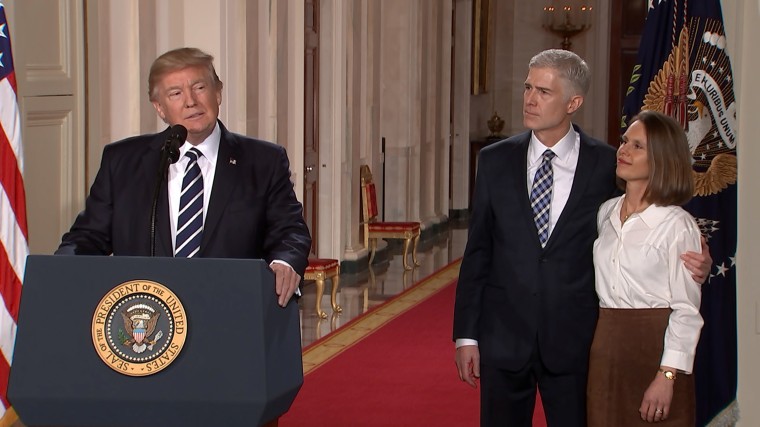TRUMP AGENDA: Everything you need to know about Neil Gorsuch
Here’s what you need to know about Neil Gorsuch and the behind-the-scenes maneuvering by the White House to keep his nomination under wraps.
The New York Times: “President Trump on Tuesday nominated Judge Neil M. Gorsuch to the Supreme Court, elevating a conservative in the mold of Justice Antonin Scalia to succeed the late jurist and touching off a brutal, partisan showdown at the start of his presidency over the ideological bent of the nation’s highest court… At 49, Judge Gorsuch is the youngest nominee to the Supreme Court in 25 years, underscoring his potential to shape major decisions for decades to come. In choosing him, Mr. Trump reached for a reliably conservative figure in Justice Scalia’s mold, but not someone known to be divisive.”
The Washington Post: “Gorsuch’s pick won extravagant praise from Republicans and conservatives, something that has been rare in the Trump administration’s combustible start. The president noted that Gorsuch had been confirmed to the U.S. Court of Appeals for the 10th Circuit 10 years ago without objection.”
And the Wall Street Journal: “Legal opinions begin with a recitation of the facts of the case. They are rarely a pleasure to read, but Judge Neil Gorsuch, President Donald Trump’s nominee to the U.S. Supreme Court, has elevated them to a form of wry nonfiction.”
How conservative is he? The New York Times analyzes his past. And the AP looks at his similarities to Scalia.
The New York Times op-ed page: “The seat Judge Gorsuch hopes to sit in should have been filled, months ago, by Merrick Garland, the chief judge of the Court of Appeals for the District of Columbia Circuit, whom President Barack Obama nominated to the court last March. Judge Garland, a former federal prosecutor and 20-year veteran of the nation’s most important federal appeals court, is both more moderate and more qualified than Judge Gorsuch.”
“President Trump has chosen his first nominee, but it remains Justice Anthony M. Kennedy’s Supreme Court. The question is how much longer he wants it,” notes the Washington Post. “Kennedy, 80 and celebrating his 29th year on the court this month, will remain the pivotal member of the court no matter how the warfare between Republicans and Democrats plays out. On almost every big social issue, neither the court’s liberal, Democratic-appointed justices nor Kennedy’s fellow Republican-appointed conservative colleagues can prevail without him. That is why an undercurrent of Trump’s first choice for the court was whether it would soothe Kennedy, making him feel secure enough to retire and let this president choose the person who would succeed him.”
From Benjy Sarlin: “Trump’s ‘America First’ Vision Could Upend Postwar Consensus”
And there’s this: “Liberty University President Jerry Falwell Jr., one of the nation's most prominent evangelical Christian leaders, has been asked to head a White House task force on reforming the U.S. higher education system, the Virginia college told NBC News on Tuesday night.”
The Washington Post delves into Steve Bannon’s past rhetoric about immigrants and American “sovereignty.”
That EO dissent cable from the State Department has 1000 signatures.
Is the White House weighing more immigration regulations? The Washington Post outlines what could happen.
DEM WATCH: To your battle stations!
Democrats are laying out their battle plans to resist Gorsuch.
More, from the Wall Street Journal: “A central question is whether Democrats, even if they oppose Judge Gorsuch’s nomination, will help Republicans meet the traditional 60-vote threshold in the Senate needed to allow the nomination to advance to a confirmation vote. Many Democrats said they had reservations about the nomination.”
